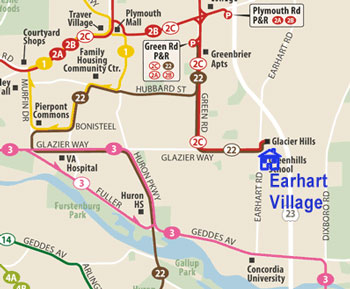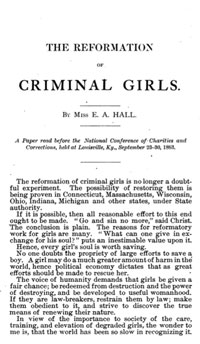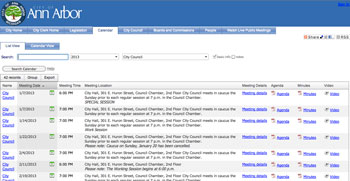Block-long line for free comics at Vault of Midnight all morning and afternoon long – lots of excitement/happiness in children and adults.
Archive for May, 2014
Millage at the Village: Ward 2 Transit Talk
Voters in Ann Arbor, Ypsilanti and Ypsilanti Township will decide on May 6, 2014 whether they want to pay an additional 0.7 mill tax for five years – to fund increased public transportation service.
Exactly one week before the vote, Ward 2 Ann Arbor city councilmembers Jane Lumm and Sally Petersen hosted a resident meeting on the topic.

This AAATA route map shows the current configuration of fixed-route buses. Label and icon for Earhart Village added by The Chronicle.
Invited were all residents of Ward 2, city residents at large, as well as representatives of the Ann Arbor Area Transportation Authority. The AAATA board voted in February to place the millage on the May 6 ballot.
About 50 people attended. Among others, the meeting drew Ward 2 city council candidate Nancy Kaplan, former Ward 1 council candidate Jeff Hayner, former mayor Ingrid Sheldon, Ward 3 council candidate Julie Grand, and state rep Jeff Irwin (D-53).
This is a report of that meeting.
Lumm and Petersen had previously co-hosted a half dozen similar meetings for their constituents on a variety of topics. The April 29 event had a potentially broader impact: At a candidate forum held on April 16, 2014, mayoral hopeful Petersen had stated that she was planning to wait until after the April 29 ward meeting to decide on a possible endorsement of the millage.
At that time, Petersen was still a little bit on the fence – but leaning toward supporting it. By then, the three other candidates in the Democratic mayoral primary – Sabra Briere, Christopher Taylor and Stephen Kunselman – had already indicated support for the additional tax.
The April 29 evening meeting was held at Earhart Village – a 174-unit condominium community just off the north-south Earhart Road, between Plymouth and Geddes. The Route #2 bus line runs from downtown to the northeast up Plymouth – with a relatively infrequent variant, Route #2C, that offers service down from Plymouth to the Earhart Village area. Accessing Route #3 to the south, on Geddes, would mean about a 1-mile walk up Earhart for an Earhart Village resident.
Frequency of service to the Earhart Village area was among the complaints of some attendees. Many in the room were negatively inclined toward the millage, as one woman announced she’d already voted no, using an absentee ballot. But there were some voices in the room that backed the proposal. Responding to criticism that the AAATA was not a “lean-and-mean” organization, a teacher in the audience made a comparison to cuts by the school district: “Lean-and-mean is not serving our students.”
AAATA staff Chris White, Michael Benham, and Mary Stasiak gave a presentation to the group before fielding questions. Lumm and Petersen structured the interaction by reading questions that attendees had written on index cards, but people were also free to ask direct questions. Some questions were pointedly critical in tone: “Does the millage money cover the additional wear and tear on the roads due to the additional buses?” And some were softballs: “Do Ward 2 constituents understand the benefit of bus expansion for low-income people and people with disabilities?”
At the conclusion of the meeting, Petersen quipped: “We had loaded questions, we had loaded answers. Hopefully one way or another we’ll have loaded buses sometime soon!” And Petersen announced her support for the millage two days later at a May 1 morning meeting of the Main Street Area Association.
However loaded the questions might have been, they elicited some useful information about how public transportation works. This report is organized along three broad themes reflected in the questions and comments from residents: overall efficiency of the AAATA as an organization; the nature of transportation funding; and some basics of public transportation service. The report is supplemented with charts generated from a national transit database. [Full Story]
In the Archives: Criminal Girls
In the fall of 1883, delegates from almost every state attended the National Conference of Charities and Corrections in Louisville, Kentucky. Penologists, prison officials, and representatives from state institutions for the blind, deaf, orphaned, insane and “feeble-minded” gathered at Louisville’s Polytechnic Institute for eight days of presentations and discussions.

Emma Hall’s 1883 talk, delivered at the National Conference of Charities and Corrections in Louisville, Kentucky, analyzed the best methods of reforming girls.
On the morning of Sept. 26, Ypsilanti resident and Normal School graduate Emma Hall faced a distinguished audience. “The reformation of criminal girls,” she began, “is no longer a doubtful experiment.”
Born February 28, 1837 on a farm in Lenawee County’s Raisin Township, Emma was the second of her parents Reuben and Abby’s eight children. Most of the family relocated to Ypsilanti around 1870. Reuben’s teaching background and Abby’s upbringing as a Congregational minister’s daughter may have influenced Emma’s career as a prison reformer. She became Michigan’s first woman to lead a state penal institution, and was later made a member of the nation’s top prison advisory committee.
After graduating from the Normal in 1861, Emma taught recitation at Professor Sill’s Seminary for Young Ladies in Detroit, for a yearly salary of $550 [about $10,000 in 2014 dollars]. Emma met Detroit House of Corrections prison superintendent Zebulon Brockway. Beginning with his work at the Detroit prison, which opened in 1861, Brockway would become a nationally-recognized though controversial prison reformer.
In 1868, Brockway opened the House of Shelter. This adjunct to the Detroit House of Corrections offered a radical experiment for women prisoners, many of whom had been arrested for prostitution. Instead of barred cells, the House of Shelter offered a comfortable group home in which each woman had her own bedroom. The home was furnished and decorated as a well-to-do middle-class home.
Brockway made Emma its first matron. She moved in and lived full-time with the women. [Full Story]
Fifth & Washington
The service berry (aka June berry) trees are in bloom. Soon to be a construction site, will these prolific and tasty fruit trees be spared? [photo]
Fifth & Huron
There are parents with grads all over downtown today. None of them will be able to enjoy our famous fountain. Why isn’t it flowing? [photo]
May 5, 2014: City Council Preview
The Ann Arbor city council’s voting agenda for its May 5, 2014 meeting is relatively light, but features some significant public hearings and a potentially controversial contract related to footing drain disconnections.

Screenshot of Legistar – the city of Ann Arbor’s online agenda management system. Image links to the May 5, 2014 meeting agenda.
One public hearing will be held on the FY 2015 budget. The 2015 fiscal year starts on July 1, 2014. City administrator Steve Powers presented his proposed budget to the council at its previous meeting, on April 21. The council will take up possible amendments and vote on the adoption of the budget at its following meeting, on May 19.
A separate budget-related public hearing on May 5 will be held on fee increases in the community services area. Notable is the proposed increase in the fees for stalls at the farmers market. The annual fee for one stall will increase from $300 to $450.
A significant voting item on the agenda is a roughly $750,000 contract with CDM Smith Inc. for continued work in connection with the city’s footing drain disconnection (FDD) program. In 2012, the city’s program to disconnect footing drains from the sanitary sewer system was suspended by the council in some areas of the city. It has continued in other geographic areas and as part of the city’s developer offset mitigation program, which requires owners of new developments to complete a certain number of FDDs. The purpose is to offset the additional flow in the sanitary system caused by new construction.
The CDM contract could draw scrutiny, because the city is currently undertaking a sanitary sewer wet weather evaluation (SSWWE) study. It’s supposed to yield a recommendation about whether to continue with the FDD program, and if so, in what form. In addition, the city’s ordinance, which requires property owners to undertake FDDs, was challenged in a lawsuit filed earlier this year. That case is pending as the city has removed the case from state to federal court and the plaintiffs are seeking to remand it back to state court. A hearing is scheduled for May 28 on the question of remand.
Also on the agenda are two contracts for general construction inspection work, each for $100,000, with Stantec Inc. and Perimeter Inc.
Three parks will be getting upgrades to play equipment if the council approves a contract with Game Time c/o Sinclair Recreation for $132,000. Arbor Oaks Park and Scheffler Park will have their play structures replaced, and North Main Park will be getting a tire swing and chess table.
Mowing and snow clearance in city parks in the future be handled with two mower/snow-broom combination units, if the council approves the purchase from Spartan Distributors for $101,000.
Three land-use items that were recommended for action by the city planning commission appear on the council’s May 5 agenda.
First, the council will consider giving initial approval to a change in the city’s zoning ordinance related to drive-thrus. In addition to providing a definition, the ordinance revision would require drive-thrus to obtain special exception use permits, which would be allowed only in the O (office), C2B (business service) and C3 (fringe commercial) zoning districts. Drive-thrus would not be allowed in the C1, D1, D2, and other commercial districts. Currently, drive-thrus are allowed in C3 districts without a special exception use. They are allowed as special exception uses in the C2B district.
Second, the council will consider giving initial approval to a rezoning request and area plan for 515 Oxford, to convert a house for use as an annex to the Delta Gamma sorority. The main sorority house is located nearby at 626 Oxford. The request, supported by the city’s planning staff, is to rezone the parcel from R4A (multi-family dwelling) to R2B (two-family dwelling and student housing).
And third, the council will consider final approval for the rezoning of land that’s been donated to the city by developer Bill Martin, founder of First Martin Corp. The 2.2-acre parcel at 3301 Traverwood Drive is being added to the adjacent Stapp Nature Area, near the Leslie Park golf course.
Sidewalks are again on the agenda in the form of a public hearing on the proposed Newport Road special assessment, which is supposed to help fund a stretch of sidewalk north of Wines Elementary School. And the council will consider the acceptance of an easement for a sidewalk at 2300 Traverwood Drive.
The council will also consider a routine item this time of year – transferring delinquent water utility, board-up, clean-up, vacant property inspection, housing inspection fees, and fire inspection invoices to the city tax roll for July 2014. The council will also be asked to approve the denial of claims against the city by the board of insurance administration.
Management of the deer population will receive some attention in the form a resolution on the May 5 agenda that directs the city administrator to partner with other organizations to develop strategies for deer management. The administrator will be asked to report back to the city council by July 31, 2014 on the status of the partnership, including budget and timelines. The resolution, put forward by Jane Lumm (Ward 2), states that the desired outcome is a community-endorsed deer management plan.
Appointments to the city’s environmental commission (EC) are on the May 5 agenda, having been postponed at the council’s April 21 meeting. All three that appeared on the April 21 agenda were re-appointments for currently serving members of the EC: Kirk Westphal, David Stead, and Susan Hutton. However, the intention at the May 5 meeting is to substitute the original resolution with one that does not include Stead.
Street closings on the agenda include: East Washington for the Ann Arbor Book Festival on June 21; East Liberty for Sonic Lunch on Aug. 21; and several neighborhood streets for the 2014 Glacier Area Homeowners Association Annual Memorial Day Parade on May 26.
This article includes a more detailed preview of many of these agenda items. More details on other agenda items are available on the city’s online Legistar system. The meeting proceedings can be followed Monday evening live on Channel 16, streamed online by Community Television Network starting at 7 p.m. [Full Story]
Column: NCAA’s Harsh Hypocrisy
When Mitch McGary played high school basketball in New Hampshire, he was one of the nation’s top recruits. Michigan fans were rightly thrilled when he decided to play for the Wolverines.
In his first NCAA tournament, last spring, McGary played so well folks thought he might jump to the NBA. Instead, he returned for his sophomore year – then injured his back so badly, he needed surgery mid-season. The Wolverines weren’t doing much better at 6-4, with Big Ten conference play still ahead. It looked like Michigan might miss the NCAA tournament.
The Wolverines proved them wrong by winning the Big Ten regular season title – its first since 1986 – with McGary cheering them on from the bench. McGary also beat the odds, recovering so quickly he dressed for Michigan’s final NCAA tournament game, joining his teammates for warm-ups.
The Wolverines’ dreams fell short when they lost to Kentucky in the regional final. After the game, the NCAA conducted its routine, random drug tests on a few players – including Mitch McGary. [Full Story]
Candidate Forum Focuses on Downtown
Speaking to about 30 people gathered at Sweetwaters in downtown Ann Arbor, three Democratic candidates for mayor answered downtown-centric questions at a May 1 forum that touched on issues of density and open space, the DDA, national chains and support for local businesses.

From left: Democratic mayoral candidates Christopher Taylor, Sabra Briere and Sally Petersen at a May 1 forum. The event was held at Sweetwaters and moderated by the Main Street Area Association. (Photos by the writer.)
The mayoral candidate forum, held by the Main Street Area Association, featured Sabra Briere, Sally Petersen and Christopher Taylor. The fourth Democrat who’s vying for the seat, Stephen Kunselman, was unable to attend. All four candidates in the Aug. 5 primary election currently serve on the city council. There are no Republicans running this year.
In addition to their opening and closing statements, candidates responded to three questions posed by Tom Murray, president of the MSAA board and owner of Conor O’Neill’s, an Irish pub located on Main Street. Candidates were asked for their views on density and open space downtown, as well as their opinion of the DDA. The third question focused on the tension between support for local business and the growing interest from national chains in locating downtown.
All three candidates talked about the need for downtown development, with Briere and Taylor saying that density and open space aren’t mutually exclusive. Briere talked about the importance of walkability, and noted that urban parks provided “punctuation points” for the community. However, she said that for Ann Arbor’s relatively small downtown, it wasn’t logical to insist on a really large downtown park.
Petersen answered the question by focusing on the development aspect, including the need for large floor-plate office space, redevelopment of the North Main/Huron River corridor, and infrastructure like public transportation. She announced her support for the transit tax proposal that’s on the May 6 ballot. All other candidates had previously endorsed the proposal, which is being put forward by the Ann Arbor Area Transportation Authority. Mary Stasiak, AAATA’s manager of community relations, attended the May 1 forum.
The candidates all expressed unequivocal support for the DDA, with Taylor in particular lamenting the political culture that he says has “scapegoated” the DDA. That was likely a reference to criticism of the DDA by Kunselman, among others. Russ Collins, a DDA board member, attended the meeting in his capacity as executive director of the Michigan Theater to promote the upcoming Cinetopia International Film Festival.
And while praising the unique character of downtown Ann Arbor and the need to support local businesses, candidates noted that it’s not possible to prevent national chains from locating downtown. Taylor said he was excited that the downtown is attractive to businesses from outside this area, though he didn’t want to see national chains come in to the exclusion of locally-owned retailers. Briere described herself as a firm advocate for local businesses, saying that the downtown should focus on specialty items that can’t be found elsewhere. Petersen said she likes the whimsy of local businesses that inspire the phrase “Keep Ann Arbor Funky,” but noted that certain national retailers – like Apple – would be a perk to downtown.
There is no incumbent in this race. Mayor John Hieftje announced last year that he would not be seeking re-election. The deadline has passed for entry into the partisan primary on Aug. 5, but it’s still possible for an independent candidate to get on the Nov. 4 general election ballot.
For additional Chronicle coverage of the mayoral race, see: “Council, Mayor Primary Election Lineups Set” and “Town Hall: Four Mayoral Candidates.” [Full Story]




